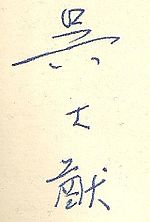Wu Ta-You
Wu Ta-You | |
|---|---|
| 吴大猷 | |
Chen Ning Yang Tsung-Dao Lee | |
| Signature | |
 |
Wu Ta-You (simplified Chinese: 吴大猷; traditional Chinese: 吳大猷; pinyin: Wú Dàyóu) (27 September 1907 – 4 March 2000) was a Chinese physicist and writer who worked in the United States, Canada, mainland China and Taiwan. He has been called the Father of Chinese Physics.[1]
Early life and education
Wu was born in
Panyu, Guangzhou (Canton) in the last years of the Qing dynasty. In 1929 he took his undergraduate degree at Nankai University in Tianjin (Tientsin). He moved to the United States for graduate schooling and obtained a Doctor of Philosophy Degree from the University of Michigan
in 1933.
Career
Wu returned to China (then
Republic of China) after receiving his doctorate degree, and between 1934 and 1949 he taught at various institutions there, including Peking University in Beijing, and National Southwestern Associated University in Kunming. In 1949, the year of the defeat of the Nationalists by the Communists in the Chinese Civil War, Wu moved to Canada
.
There he headed the Theoretical Physics Division of the
Republic of China), including the President of the Academia Sinica
(1983–1994). He continued lecturing into his 90s and died on March 4, 2000.
Wu's PhD dissertation dealt with theoretical predictions of the
Chen Ning Yang and Tsung-Dao Lee, co-winners of the Nobel Prize in Physics
in 1957.
Wu wrote several books, best known of which are the monograph Vibrational Spectra and Structure of Polyatomic Molecules (1939) and the graduate level textbooks Quantum Mechanics (1986) and (as co-author) Relativistic Quantum Mechanics and Quantum Fields (1991).
Awards and honors
- Beginning from 2002, National Science Councilof Republic of China (reformed as the Ministry of Science and Technology since 2014) gives out Wu Ta-You Memorial Award every year.
- The Department of Physics of the University at Buffalo hosts Ta-You Wu Lecture.[1]
- The Department of Physics of the University of Michigan hosts Ta-You Wu Lecture.[2]
- Asteroid M.P.C. 75106).[3]
References
- ^ a b "256892 Wutayou (2008 DW40)". Minor Planet Center. Retrieved 4 September 2019.
- ^ Ta-You Wu Lecture Archived 2015-06-02 at the Wayback Machine
- ^ "MPC/MPO/MPS Archive". Minor Planet Center. Retrieved 4 September 2019.
External links
- A Biographical Sketch of Dr. Ta-You Wu – Lee, Ting-Kuo (2007). AAPPS Bulletin 17, 5.
- A Chronology of Ta-You Wu's Life and Career, Hsu, Jong-Ping and Leonardo (1998). JingShin Theoretical Physics Symposium in Honor of Professor Ta-You Wu. World Scientific Publishing.
